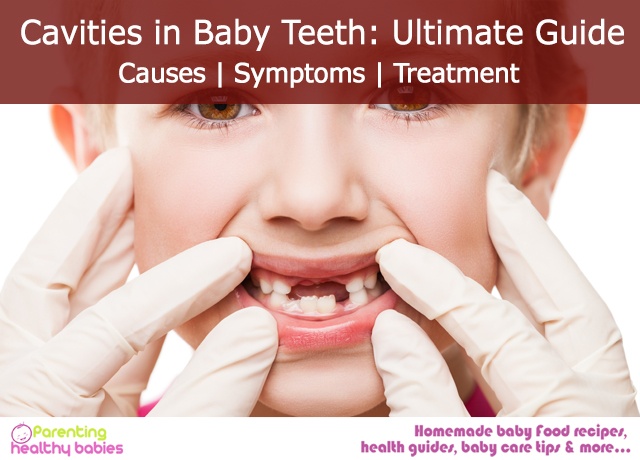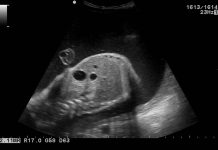Did you notice the baby teeth appearing in your baby’s mouth at about 6 months? It is definitely a moment of joy when your baby begins sprouting baby teeth and by the age of about 3 years, you are likely to see a full complement of 20 baby (primary) teeth, with 10 teeth in each jaw. Just as adults are prone to cavities in their teeth, so are children. Despite meticulous care, a cavity may develop in your precious child’s baby teeth and become a cause of concern for parents. Dental caries in baby teeth may be primary – occurring for the first time or recurrent – developing once again in a previously carious tooth.
Read More: Baby Teethers: Ultimate Guide for New Moms
Cavities in Baby Teeth: Ultimate Guide
What is a dental cavity in a baby tooth?
A cavity is essentially dental decay or dental caries. It may begin as just a chalky white spot. It then proceeds to spread over the entire tooth surface. Dental decay of baby teeth usually begins on the maxillary primary incisors first (the upper front baby teeth). Eventually, staining by food results in a brown or black discoloration of the tooth and gives it an unsightly appearance. It may occur on the top part or the part you can see of a tooth (occlusal dental caries). Or dental decay may occur in between two teeth, which is not visible (proximal dental caries). Dental decay of baby teeth starts with a white line along the gums of the baby teeth and gradually extends onto the full tooth.
Read More: Are Baby Teeth as Important as Adult Teeth?
What can cause cavities in my baby’s teeth?
The main cause of dental decay in baby teeth is due to microorganisms, specifically Streptococcus mutans and Streptococcus sobrinus. These are bacteria that stick to hard tooth surfaces as soon as the baby teeth start erupting into the mouth. These bacteria use sugars and starches from food to create acid that erodes teeth and creates cavities. There are a number of factors that can increase the risk of dental caries or cavities in a child’s baby teeth. Bottle feeding practices are very important in this regard. Night time bottle feeding and prolonged bottle feeding beyond 1 year of age are associated with caries in baby teeth. Frequent consumption of sugary and sweet food such as chocolates, cookies and toffees, in between meals is also a harmful habit in terms of dental decay. Poor oral hygiene and brushing less than twice a day may also result in dental caries.
Read More: Is My Baby Teething: 11 Sign of Teething
Do I need to get baby tooth cavities treated?
Yes, it is very important to get early dental decay in baby teeth treated as soon as possible. You may take your child to a pediatric or children’s dentist to get his or her teeth checked first. If left untreated, one small spot of dental decay can spread over multiple teeth rapidly. The consequences of untreated baby tooth dental caries are a poor esthetic appearance of your child’s smile due to yellow or brown staining of teeth due to dental decay. There can also be difficulty in chewing due to pain because of dental caries.
Untreated dental decay in advanced stage can lead to dental abscesses and severe pain. These result in poor appetite, disturbed sleep, loss of school days due to pain and dental visits. Poor nutrition and poor overall body growth are also unfavorable consequences of untreated dental caries in baby teeth. A child may also lose self esteem and confidence if he or she dislikes his or her smile or if friends tease him or her for the same. Advanced dental decay in baby teeth may require tooth extractions which are traumatic for a child. Complex dental treatment under general anesthesia may also be required if multiple untreated teeth decay is present involving many teeth, which again is not free of risks.
Read More: 6 Ways to Soothe Your Baby’s Teething Process
Will baby tooth cavities affect permanent (adult) teeth?
Yes, very much so. A child who develops dental decay or cavities in baby teeth is much more likely to develop dental decay in permanent (adult) teeth too. An important function of baby teeth is to hold space for developing, underlying permanent (adult) teeth. If a baby tooth are extracted or lost due to dental decay, the space that the baby tooth held for the permanent successor closes. As a result, there is inadequate space for the permanent tooth to erupt into. The permanent tooth thus erupts out of alignment, a situation which will require dental correction at a later date.
How can I prevent cavities in my baby’s teeth?
The easiest way to avoid long and tedious dental care is through prevention. Take a look at a few preventive strategies which you, as a parent can easily use in everyday. Begin brushing your child’s teeth as soon as the first tooth comes into the mouth. Brush your child’s teeth with a toothpaste containing fluoride, twice daily. Avoid bottle feeding your baby beyond 1 year of age. Avoid colas or soft drinks because of their high acidic and sugar content. Avoid sugary and sticky food such as chocolates and candies between meals. Avoid sharing utensils such as spoons with your child, as bacteria are transmitted through this process, from your mouth to the child’s mouth.
Take your child to visit a pediatric or children’s dentist as soon as baby teeth begin erupting into the mouth. This dentist can check your baby’s mouth for cavities, especially hidden ones that lie between teeth and are not visible easily.
Read More: When to Start Brushing Baby’s Teeth?
A healthy mouth is the key to maintaining a healthy body!
References
https://www.ncbi.nlm.nih.gov/pmc/articles/PMC3633299/
https://www.cda.org/Portals/0/pdfs/untreated_disease.pdf













